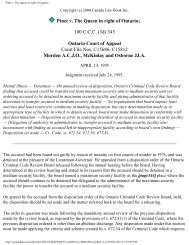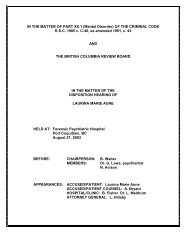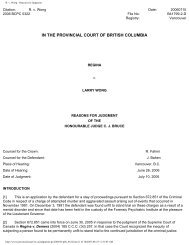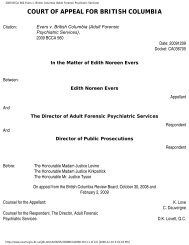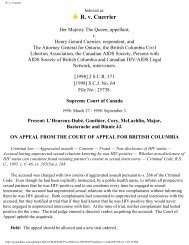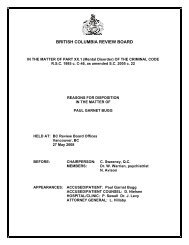R. v. CONWAY - British Columbia Review Board
R. v. CONWAY - British Columbia Review Board
R. v. CONWAY - British Columbia Review Board
Create successful ePaper yourself
Turn your PDF publications into a flip-book with our unique Google optimized e-Paper software.
paramount concern, an NCR patient’s liberty interest has been held to be the <strong>Board</strong>’s “major<br />
preoccupation” within the fence posts staked by public safety (Pinet v. St. Thomas Psychiatric<br />
Hospital, 2004 SCC 21, [2004] 1 S.C.R. 528, at para. 19). The <strong>Board</strong> fulfills its “primary purpose”<br />
therefore by protecting the public while minimizing incursions on patients’ liberty and treating<br />
patients fairly (Mazzei, at para. 32; Winko, at paras. 64-71; Penetanguishene, at para. 51).<br />
[89] Section 672.54 of the Criminal Code sets out the remedial jurisdiction of review<br />
boards, stating:<br />
Where a court or <strong>Review</strong> <strong>Board</strong> makes a disposition under subsection 672.45(2) or<br />
section 672.47 or 672.83, it shall, taking into consideration the need to protect the public<br />
from dangerous persons, the mental condition of the accused, the reintegration of the<br />
accused into society and the other needs of the accused, make one of the following<br />
dispositions that is the least onerous and least restrictive to the accused:<br />
(a) where a verdict of not criminally responsible on account of mental disorder has been<br />
rendered in respect of the accused and, in the opinion of the court or <strong>Review</strong> <strong>Board</strong>,<br />
the accused is not a significant threat to the safety of the public, by order, direct that<br />
the accused be discharged absolutely;<br />
(b) by order, direct that the accused be discharged subject to such conditions as the<br />
court or <strong>Review</strong> <strong>Board</strong> considers appropriate; or<br />
(c) by order, direct that the accused be detained in custody in a hospital, subject to such<br />
conditions as the court or <strong>Review</strong> <strong>Board</strong> considers appropriate.<br />
Accordingly, at a disposition hearing regarding an NCR patient, the Ontario <strong>Review</strong> <strong>Board</strong> is<br />
authorized to make one of three dispositions: an absolute discharge, a conditional discharge or a<br />
detention order. When making its disposition, the <strong>Board</strong> must consider the four statutory criteria:



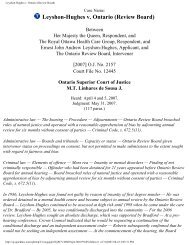
![LaFortune [LaFortunate] (Re) - British Columbia Review Board](https://img.yumpu.com/42779845/1/190x245/lafortune-lafortunate-re-british-columbia-review-board.jpg?quality=85)
